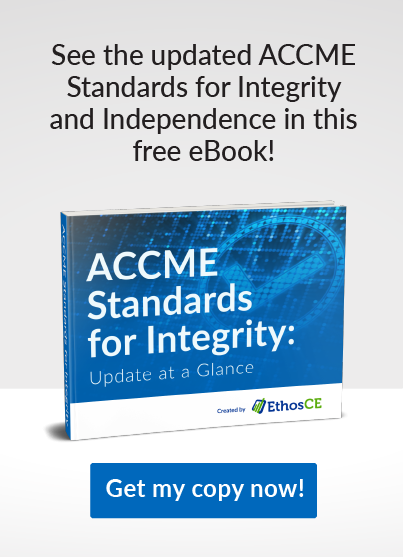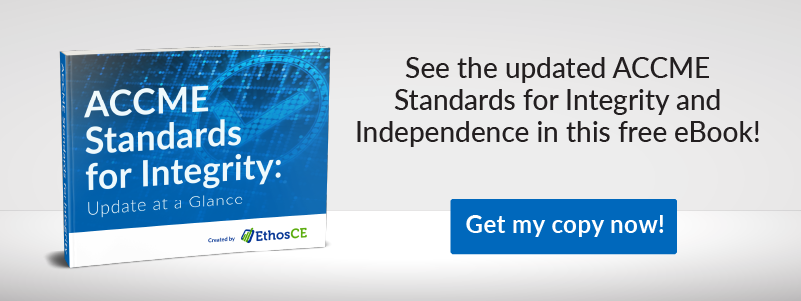What’s Changing in ACCME Commercial Support Guidelines?
Continuing medical education (CME) is expected to be evidence-based and free from any bias. However, in many instances, it is industry supported and has the potential to influence educators and CME providers. Any partiality can, in turn, influence attendees’ choice of drugs, medical devices, or other products or services that can affect health care.
With the recent changes to the ACCME Standards for Integrity and Independence in Accredited Continuing Education, several guidelines now address accredited providers’ roles and responsibilities with regard to commercial support.
Here, we look at what is changing now that these ACCME guidelines for commercial support are coming into play.
Biased CME?
Ineligible companies have long been a major factor in CME, particularly in the pharmaceutical and medical device industries. In a recent ACCME Annual Data report, 28% of continuing medical education funding came from these two industries. In addition, 10% of all CME activities were pharmaceutical company backed.
The greatest concern is that because CME is a rapidly growing industry, ineligible companies like “Big Pharma” and medical device companies are taking advantage of this growth. Physicians are noting this trend, with 88% believing that commercial support of CME introduces a substantial risk of bias. It’s also their belief that CME conference organizers could offer their activities in such ways to attract these company sponsors and the associated funding.
Industry-supported CME has the potential to unconsciously be a bias of accredited providers and educators; such biases may influence an activity attendee’s choice of drugs or devices, which in turn, affect their patients’ care.
This brings us to speakers or others involved in CME activities who have financial relationships with the industry. They may (or may not) be aware of bias in their presentations. For example, they might mention the sponsor’s drug or device by its trade name, while using the generic name for a competitor’s product. They may minimize any side effects or interactions or even discuss off-label uses. Even research publications aren’t immune: many are often industry-funded, demonstrating their bias toward the event’s sponsor.
The question then becomes this: would changes in industry involvement in CME activities resolve the problem? The answer is yes. The ACCME guidelines for commercial support have undergone changes to address the issues that you face as an accredited provider.
How to Manage Your Commercial Support
The ACCME guidelines for commercial support are clear-cut when it comes to managing your industry interactions. Its Standard 4 states that if you’re planning an activity for which you’ll be receiving commercial support, you’re responsible for ensuring that your education stays independent of the ineligible company that’s providing it. That support cannot result in commercial bias or influence in the education, nor can it establish financial relationships between the industry company and planners, faculty, or others in control of the educational content.
What else do you need to know about managing your commercial support, since you’re the one making all the decisions regarding its receipt and disbursement? For starters, be sure to:
- Document all terms and conditions in an agreement before the education begins.
- Keep detailed records of the commercial support and how it was used.
- Disclose the name(s) of the companies providing the support and the nature of the support to your learners, but not their corporate or product logos, trade names, or product group messages.
There are also things to know when it comes to payments.
How to Navigate the Ancillary Activities During Your Accredited CME
As part of the ACCME guidelines for commercial support, Standard 5 sends out serious messages when it comes to ineligible company involvement. You’re also expected to ensure that your learners can easily distinguish between your accredited education and other activities, including ineligible companies’ marketing and non-accredited activities.
When it comes to live activities—whether they’re virtual or in person—there must be a thirty-minute window before and after your accredited activities and that of other activities. Be sure to clearly label the non-accredited activities.
For your print, online, or digital activities, make sure your learners can engage with your accredited education without having to click through, watch, listen to, or be presented with product promotion or product-specific advertisements.
Also, any educational materials that are part of your accredited education, such as slides, abstracts, handouts, evaluation mechanisms, or disclosure information, must not contain any marketing produced by or for an ineligible company, including their corporate or product logos, trade names, or product group messages.
ACCME Fast FAQs
The ACCME provides answers to common commercial support questions. Here are just a couple:
- Can I use commercial support to pay for its services in the production and distribution of a CME activity, such as certificates and mailings?
- Yes.
- Can I offer ineligible companies different levels of designation for different amounts of commercial support?
- Yes.
Always Doing It Right
Working with ineligible companies can be accomplished if done correctly with the ACCME guidelines for commercial support. CME must remain free from industry influence so physicians can further develop their skills and knowledge that will help lead to better patient outcomes.
At EthosCE, we understand the challenges of staying up to date and compliant with ACCME changes. We know how critical it is to get things done right the first time when it comes to team-based education and success.
To learn how EthosCE can enhance the continuing education of your healthcare teams, schedule a free 1-on-1 demo with one of our specialists today!
 We're now part of the Cadmium product suite! Learn more
We're now part of the Cadmium product suite! Learn more 


